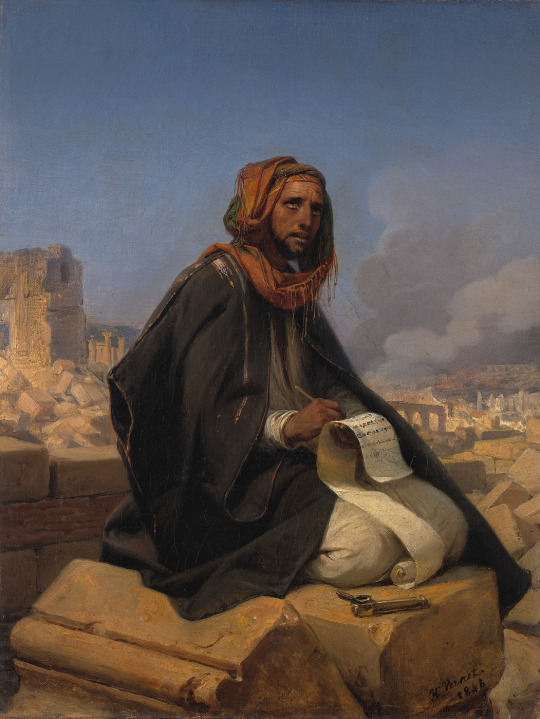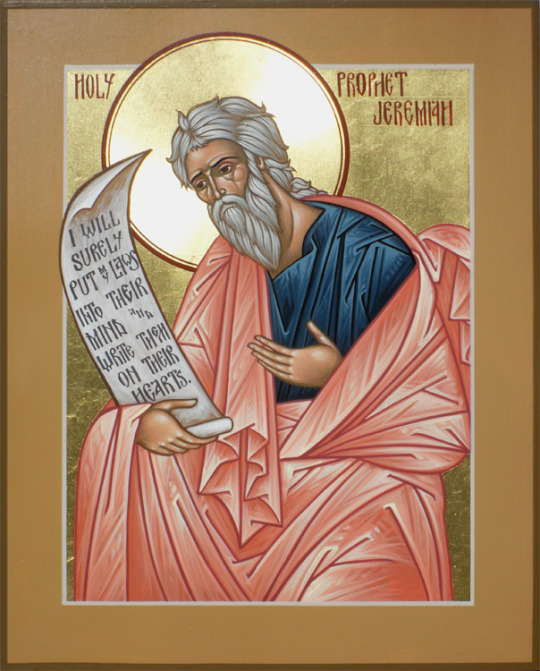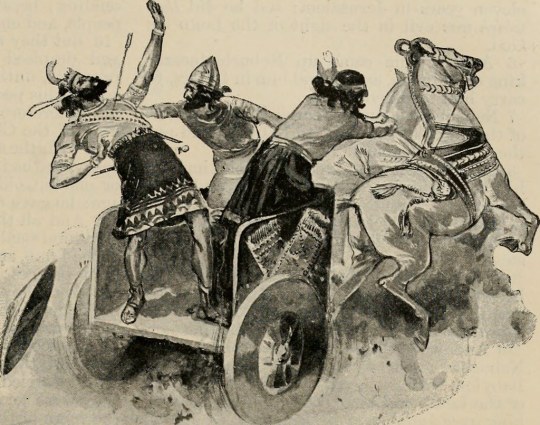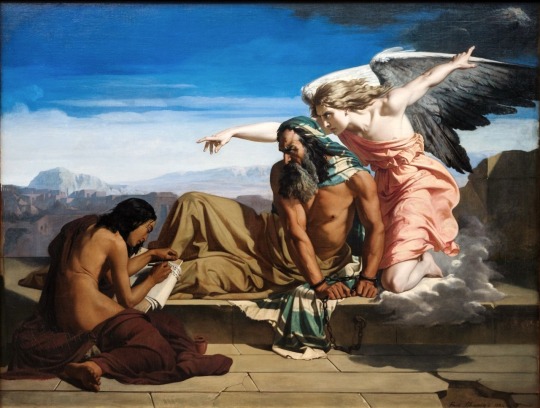#prophet Jeremiah
Text

Jeremiah in the Ruins of Jerusalem, Horace Vernet, 1844
#art#art history#Horace Vernet#religious art#Biblical art#Christian art#Christianity#Old Testament#Hebrew Bible#Prophet Jeremiah#Lamentations of Jeremiah#French art#19th century art#color and resin on canvas#Amsterdam Museum
257 notes
·
View notes
Text



Top Left: Icon of the Prophet Isaiah
Top Right: Icon of the Prophet Jeremiah
Bottom: The Death of King Josiah
The person responsible for seven books of the Bible […] deliberately designed his history of the people to culminate in [King] Josiah. Josiah was not just good, and he was not just important. In the writer's picture, Josiah, in many ways, was someone to be compared to Moses himself. [... T]he Deuteronomistic historian paints Josiah in special colors - Mosaic colors. He is the culmination of that which began with Moses. His actions in his day emulate Moses' actions in his own day. He is the hope that the covenant that began with Moses will be fulfilled as never before. [...] All of the Deuteronomist's major themes —fidelity, torah, centralization, Davidic covenant— culminated in Josiah.
And then Josiah died from an Egyptian arrow.
- Richard Elliot Friedman (Who Wrote the Bible?, pages 94-95, 97, 116). Bolded emphases added.
Psalm 72 gives a description of the perfect king of Israel. He would be someone who was filled with wisdom like Solomon, as well as being a great warrior who could enlarge the boundaries of Israel from sea to sea, one of David's accomplishments. He would also guarantee justice in the land, especially to the poor.
[...]
None of the kings of Israel would fulfill all of these expectations. Every time that the prophets spoke of a king whom they hoped would finally do the will of the LORD, they ended up being disillusioned. Thus, they began to speak about an anointed one in the future who would be unlike all the other kings of Israel.
- Rev. Jude Winkler, O.F.M. Conv.'s commentary on Psalm 72
In any case, we should still note that the years between 722 and 587 were not unceasingly bleak. These were times of powerful persons and great events, of the rise and fall of great empires. This period included times of hope and vision, especially, it appears, during Hezekiah's and Josiah's reigns. These times produced an Isaiah, a Jeremiah, and an Ezekiel. Precisely in this age of empires in conflict, of rebellions, of violence, and of cruelty, a man conceived of an era when
They will beat their swords into plowshares
and their spears into pruning-hooks.
A nation will not raise a sword against a nation,
and they will not learn war anymore.
- Richard Elliot Friedman (Who Wrote the Bible?, pages 94-95, 97, 116). Bolded emphases added.
#Prophet Isaiah#Prophet Jeremiah#King Josiah#King Hezekiah#Messiah#Christianity#Catholicism#Judaism#Kingdom of God#icon#King David#King Solomon#peace
4 notes
·
View notes
Text
i have fallen back into my jerome and jeremiah valeska phase/gotham phase and im not upset about it😂
25 notes
·
View notes
Text
Why do the wicked prosper?
“You are always righteous, LORD,
when I bring a case before you.
Yet I would speak with you about your justice:
Why does the way of the wicked prosper?
Why do all the faithless live at ease?
You have planted them, and they have taken root;
they grow and bear fruit.
You are always on their lips
but far from their hearts.”
- Jeremiah 12:1-2 NIV (2011)
#bible verse#questions#prophet jeremiah#prayers#justice#God's will#why good things happen to bad people#unfaithfulness#wickedness#the wicked#jeremiah 12#new international version
12 notes
·
View notes
Text
Restoration (Jeremiah 30:1-11a)
No matter how nasty, misguided, or sinful the political leadership and governmental system, none of those rulers or politicians have the last word.
This is the word that came to Jeremiah from the Lord: “This is what the Lord, the God of Israel, says: ‘Write in a book all the words I have spoken to you. The days are coming,’ declares the Lord, ‘when I will bring my people Israel and Judah back from captivity and restore them to the land I gave their ancestors to possess,’ says the Lord.”
These are the words the Lord spoke concerning Israel…

View On WordPress
#adversity#despair#distress#god&039;s deliverance#god&039;s grace#god&039;s judgment#god&039;s presence#god&039;s promise#hard circumstances#hardship#hope#jeremiah 30#oppression#prophet jeremiah#renewal#restoration#spiritual distress#spiritual life#spiritual renewal#spiritual restoration#trauma#troubles
0 notes
Text
Thus saith the LORD, Let not the wise man glory in his wisdom, neither let the mighty man glory in his might, let not the rich man glory in his riches:
But let him that glorieth glory in this, that he understandeth and knoweth me, that I am the LORD which exercise lovingkindness, judgment, and righteousness, in the earth: for in these things I delight, saith the LORD.
~ Prophet Jeremiah (Jeremiah 9:23-24)
A good reminder from scripture that no matter how intelligent, strong or rich you become, that ultimately these things will never please the Almighty. Rather being loving towards others, exercising proper judgment & striving to be righteous are what counts.
#bible#prophet jeremiah#jeremiah#wisdom#strength#wealth#loving kindness#judgment#righteousness#ethics#God
0 notes
Photo

Jeremiah Dictating his Prophecies by Henri Lehmann (1842)
Let the prophet who has a dream recount the dream, but let the one who has my word speak it faithfully. For what has straw to do with grain?” declares the Lord. “Is not my word like fire,” declares the Lord, “and like a hammer that breaks a rock in pieces?
—Jeremiah 23
Because of the courage and vision of the exiled Prophets, the old Hebrew deity now developed into that universal and eternal concept of the Divine Spirit which is accepted by the people of the modern world as the highest expression of Truth and Love.
—Hendrik Willem van Loon, The Story of the Bible
Let us take the Bible (and recent historical research shows that the Bible is a true and not an untrue document); consider the prophets from Isaiah to Malachi, through Jeremiah, Ezekiel, and Daniel, and study what it relates of these figures. You will find that you cannot bring these prophets into the general scheme of initiation. Where does the Bible relate that the Jewish prophets went through the same kind of initiation as other initiates belonging to different peoples? It is said they appeared when the voice of God stirred in their souls, enabling them to see in a different way from ordinary men, making it possible for them to make indications as to the future course of the destiny of their people and the future course of the world's history. Such indications were wrung from the souls of the prophets with elemental force. It is not related of them, in the same way as it is related of other prophets, how they went through their initiation. The spiritual vision of the Jewish prophets seems, so to speak, to spring from their own genius, and this they relate to their own people and to humanity.
—Rudolf Steiner, The Gospel of St. Mark II
See also The Twelve Senses, Forces & World Views
#Henri Lehmann#Old Testament#Prophet Jeremiah#Christ in Pisces#Pisces#the sense of movement#anthroposophy#spiritual science
1 note
·
View note
Text
Tel Hazor
Unlike the other cities of Canaan, including even Megiddo, Hazor was the master. Like Rome would be millennia later, all roads led to and from Hazor, the largest fortified city in the country. #Hazor #Hatsor #KingJabin #Deborah

View On WordPress
#Barak#Deborah#ebenezer#hatsor#hazor#king jabin#matzebot#prophet jeremiah#solomon#standing stones#tiglath pileser
0 notes
Text

Before I Formed You
Before I formed thee in the belly I knew thee; and before thou camest forth out of the womb I sanctified thee, and I ordained thee a prophet unto the nations.
— Jeremiah 1:5 | Cambridge Paragraph Bible (CAMB)
The Cambridge Paragraph Bible of the Authorized English Version, by Scrivener, Frederick Henry Ambrose, 1813-1891. Published by Cambridge University Press.
Cross References: Psalm 139:15-16; Isaiah 49:1; Luke 1:15; John 10:36; 1 Corinthians 8:3; Galatians 1:15
#creation#God#form#womb#set apart#appointed#prophet#nations#Jeremiah 1:5#Book of Jeremiah#Old Testament#Cambridge Paragraph Bible#CAMB#Cambridge University Press
20 notes
·
View notes
Note
I've been searching for an answer for this on my own but I just remembered that you might be the person to ask.
Do you know of any explanations the Church Fathers made on passages such as Jeremiah 44:17 "the queen of heaven"? It's a Marian title now but here it seems to be a reference to an idol? I really would like a Church Fathers perspective on this because otherwise I'm just left to explain to myself that the term was reclaimed.
Do you know of anything that could help me?
You're right, this is contextual; the Catena Bible commentary for Jeremiah 44:17-19 claim that the Queen of Heaven being worshiped here is claimed by Theodoret of Cyrrhus to be Venus, and that the Israelites are participating in the rites of their neighbors.
I do think that we're stuck with the explanation that the title "Queen of Heaven" is simply one that has an appropriate context (Mary as Mother of God, with a pedigree going at least as far back as Andrew of Crete in the early 700s), and an inappropriate context (attributed to a goddess).
Now, if that's unnerving, I would keep in mind that there are other instances in the Christian tradition in which a title is attributed to both good and bad personalities. To list two examples:
Lucifer is nowadays often synonymous with the devil, but if you were to read the Easter Exsultet in Latin, Jesus is also referred to as Lucifer; it means "light-bringer," and refers to the morning star (i.e. the planet Venus). In English, Jesus is "the Morning Star which never sets," while in Latin He is "lúcifer, qui nescit occásum."
John the Baptist is sometimes called John the Forerunner, because he went before the Lord to prepare His way. Jesus is likewise referred to as our Forerunner in the Book of Hebrews, because He has entered heaven before us "on our behalf" (6:20). Yet this title also refers to a demon identified by the Desert Fathers, an evil spirit that gets its name from its attempts at the start of our day to tempt us into sin.
I think we might be stuck with the fact that titles can be applied to various figures, and the positive or negative aspects of those titles largely have to do with the views of the figure that they are being applied to.
#Christianity#Virgin Mary#Prophet Jeremiah#John the Baptist#Jesus Christ#Lucifer#demon#Aphrodite#Our Lady Queen of Heaven#asks#Andrew of Crete#Theodoret of Cyrrhus
14 notes
·
View notes
Photo

Jeremiah 1:5 (WEB) -
“Before I formed you in the womb, I knew you.
Before you were born, I sanctified you.
I have appointed you a prophet to the nations.”
72 notes
·
View notes
Text

'Prophet Jeremiah'. Harmonia Rosales. 2017.
45 notes
·
View notes
Text
Accept the Situation (Jeremiah 30:12-22)
I find it curious that so many folks who believe in the Bible have never read the Old Testament prophets.
“This is what the Lord says:
“‘Your wound is incurable, your injury beyond healing.There is no one to plead your cause, no remedy for your sore, no healing for you.All your allies have forgotten you; they care nothing for you.I have struck you as an enemy would and punished you as would the cruel,because your guilt is so great and your sins so many.Why do you cry out over your…

View On WordPress
#acceptance#adversity#cross#difficulty#grief#hard circumstances#hardship#healing#jeremiah 30#lament#negative#pain#peace#positive#prophet jeremiah#restoration#sin#spiritual life#submission#suffering#the prophets
1 note
·
View note
Text
I just had a visceral flashback regarding an assignment in psychology class back in 11th grade, where we had to draw a representation of a mental illness on a 3x5 card. I did mine on Stockholm syndrome, and parodied the formatting of 1990s — 2000s Watchtower front covers (“Stockholm Syndrome, What is it?”) and drew a detailed political cartoon of Caleb and Sofia dreamily hugging a maniacal Steven Lett, who was holding marionette controllers, attached to their limbs. I’m not sure if I still have it somewhere, if it was destroyed in The Great Bookburning of 2019, or if my psych teacher has it… but I can picture it in my head and it‘s positively revolting (I had purposefully drawn the expressions to make it look as menacing, and borderline p***phillic as I possibly could without getting myself referred to the school counselor; because I was freshly deconverted and VERY pissed off, that’s why).
I also parodied the JW tracts (destroyed), as well as the business cards (intact; she asked me if she could keep that one and I agreed… I should’ve given her all of them (she wanted the others too). At least she’d enjoy them and not bash me for expressing myself). Every single one of them was copied to the letter, with fake QR codes on the back and everything. The business card was an advertisement for therapy (we were studying the different techniques and identifying them); I specialized my “practice” for cult trauma. And then the tract was an assignment where we had to make a trifold pamphlet for something… maybe the five stages of grief??? I think it was something like that.
#I kind of want to recreate all of them Jeremiah the Prophet style 👀#One good thing about me is I can recreate things I made within 78% accuracy so long as I have a mental image of them#And I have a mental image of all these things#exjw#ex cult#apostate
16 notes
·
View notes
Text
Here's a Bible passage that the evangelicals overlook while they are hunting for stuff to blast gays and transgenders. There are many more like this, even in the Old Testament.
"Doom for the man who founds his palace on anything but integrity, his upstairs rooms on anything but honesty, who makes his fellow man work for nothing, without paying him his wages, who says 'I will build myself an imposing palace with spacious rooms upstairs', who pierces lights in it, panels it with cedar, and paints his room vermillion." Jeremiah 22: 13-14.
13 notes
·
View notes